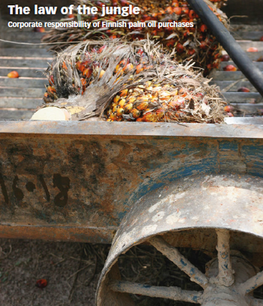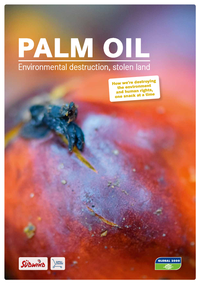Palm Oil: Environmental destruction, stolen land
How we’re destroying the environment and human rights , one snack at a time.
A delegation from GLOBAL2000 and Südwind went to Indonesia during the summer of 2016 in order to investigate the palm oil supply chain. The result is a report that offers a summary of background information about palm oil and its problematic.
How and where is it grown? What makes palm oil different from other vegetable oils? How much of it is used in what products, and why? What are the consequences for the local people and the natural environment – and what are the possible solutions, from boycotts to certification?
In order to offer a tangible insight into the topic from the consumer perspective, we’ve also had a look at the palm oil situation on our own shelves back home. We picked out a product that’s quite innocent in itself – cookies – and investigated how many types of biscuit actually contain palm oil, and whether those that do use certified palm oil.
The law of the Jungle
Malaysia's palm oil industry has severe and well-documented problems with abuse of migrant workers, including widespread forced labor and human trafficking. Over 80% of the workers at palm oil plantations are migrant workers from countries such as Indonesia, Bangladesh and Nepal.
In 2014, the U.S. State Department’s Annual Trafficking in Persons report gave Malaysia the lowest possible rating, meaning the Malaysian Government “…does not fully comply with the minimum standards (to end human trafficking) and is not making significant efforts to do so.” Despite the State Department’s recent controversial decision to upgrade Malaysia to the Tier 2 Watch List, there is wide agreement among trafficking experts that abuses continue unabated, and the Government has failed to take meaningful steps towards addressing this severe problem.
In 2014, Finnwatch released a report finding serious labour rights violations in RSPO certified estates in Malaysia. According to the report, a major Malaysian palm oil company, IOI Group, paid wages lower than the statutory minimum wage, confiscated its workers’ passports and restricted freedom of association. A large number of IOI Group's plantation workers had no understanding of their employment contracts, which were written in (to them) a foreign language.
Download the follow-up report on this investigation published by Finnwatch in 2015
Download the second follow-up report on this investigation published by Finnwatch in 2016





